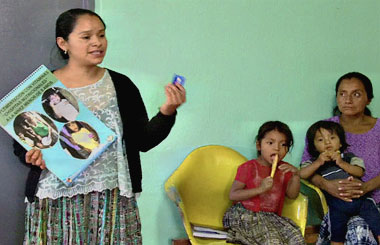Field Stories
Follow the vitamin A to an island in Bangladesh
March 12, 2025
WP_Term Object
(
[term_id] => 49
[name] => Field Stories
[slug] => all-field-stories
[term_group] => 0
[term_taxonomy_id] => 49
[taxonomy] => news-category
[description] => Discover the personal stories of people whose lives have been impacted by better nutrition, and those working tirelessly to deliver it.
[parent] => 0
[count] => 180
[filter] => raw
)
Zinc pilot program in Guatemala ready for scale up
It's early morning at the Santa Cruz Health Centre in Alta Verapaz department of Guatemala and the waiting room buzzes with the voices of children, their caregivers and staff.
Posted on June 21, 2010


It’s early morning at the Santa Cruz Health Centre in Alta Verapaz department of Guatemala and the waiting room buzzes with the voices of children, their caregivers and staff.
Each child is first weighed, measured and health card checked. Staff note what the child has been brought in for and a vitamin A capsule or vaccination is administered if those aren’t up to date.
In the waiting room, health educator Adelina Mo has a captive audience while caregivers wait to see the nurse or doctor.
It’s diarrhoea season and Adelina is talking about how to treat this potentially deadly illness. Using the local language of Pocomchi, she explains that when children get sick with diarrhoea, they should continue to be fed, be given fluids and treated using a combination of oral rehydration salts (ORS) and zinc tablets.
Annually, up to 1.5 million children die of diarrhoeal disease. While the use of ORS to treat diarrhoea has been used for decades now, recent studies have shown that adding a 10-day course of zinc supplements can not only help children recover faster, it can even save their lives.
Zinc promotes immunity, resistance to infection, and the growth and development of the nervous system. It also promotes the production of antibodies against intestinal pathogens. A course of zinc supplementation can increase children’s resistance to further episodes of diarrhoea and other disease for two to three months following supplementation.
The Santa Cruz Health Centre where Adelina works was part of a pilot project to introduce zinc supplements for the treatment of diarrhoea. With the support of the Micronutrient Initiative, through funding from the Izumi Foundation, the Guatemalan Ministry of Health introduced zinc treatment in three districts in 2007. The project included supplies, training, communications materials, monitoring and supervision. Local staff were trained on how to teach caregivers on the proper use of the supplements.
The initial pilot project was very successful, with high rates of adherence, especially among less-educated and poorer mothers. Building on this success, the project was expanded from three districts to 19 across Alta Verapaz and has since been taken up as a national project by the Ministry of Health.
Estela Cojoc, a district health officer in Alta Verapaz for the Ministry of Health, was an early champion of the project.
“We concentrated a lot our initial efforts on capacity building with health personnel,” she explains. “We wanted them to really get the message out to caregivers about what the benefits of the zinc tablets were.”
When asked why so much effort was put into training at the beginning of the project, Estella replies “Because we had to ensure results. If we could demonstrate results in these three districts, it would be easier to introduce it into other districts.”
When there was a brief stock-out of zinc supplements over the winter months, it was noticed by parents.
“They were coming to the health centre and receiving the ORS,” explains Estela. “Then they would ask for the ‘white pills´, the zinc strips. They could really see the change the zinc tablets were having on their children.”
It’s clear that Adelina’s message is being heard and, with the addition of something as simple as zinc supplements, we can help save the lives of children in Guatemala.